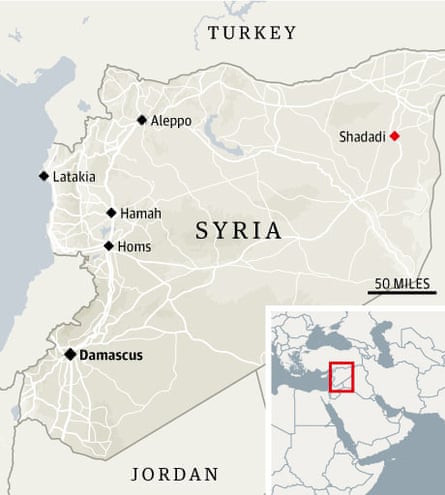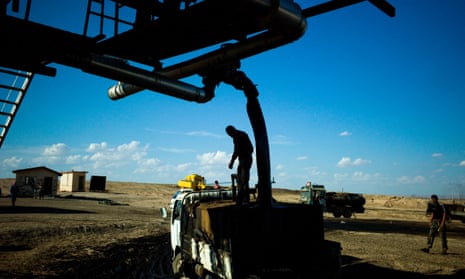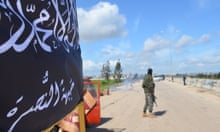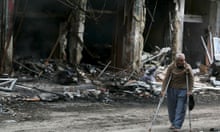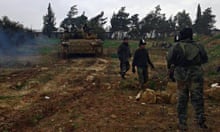The al-Qaida-affiliated commander in charge of the oil company in Shadadi, eastern Syria – a lean, broad-shouldered man who is followed everywhere by a machete-wielding bodyguard – was explaining the appeal of jihadi rule to the people of the newly captured town.
“Go and ask the people in the streets whether there a liberated town or city anywhere in Syria that is ruled as efficiently as this one,” he boasted. “There is electricity, water and bread and security. Inshallah, this will be the nucleus of a new Syrian Islamic caliphate!”
The al-Nusra Front, the principle jihadi rebel group in Syria, defies the cliche of Islamist fighters around the Middle East plotting to establish Islamic caliphates from impoverished mountain hideaways. In north-eastern Syria, al-Nusra finds itself in command of massive silos of wheat, factories, oil and gas fields, fleets of looted government cars and a huge weapons arsenal.
The commander talked about the services al-Nusra is providing to Shadadi’s residents. First, there is food: 225 sacks of wheat, baked into bread and delivered to the people every day through special teams in each neighbourhood. Then there is free electricity and water, which run all day throughout the town. There is also al-Nusra healthcare, provided from a small clinic that treats all comers, regardless of whether they have sworn allegiance to the emirate or not. Finally, there is order and the promise of swift justice, delivered according to sharia law by a handful of newly appointed judges.
“God has chosen us to provide security to the people, and we do it for nothing,” he said. “We have vowed to sacrifice ourselves to serve the people. If we leave, the tribes will start killing each other for the oil and the loot. We had to show force in dealing with the tribes. Even now, one to three people are killed every day because of feuding over the oil. We also protect the silos of wheat. All the silos are under our protection.
“All this wealth,” he said, “is for the Muslims.”
The emir of gas
A few miles from Shadadi, travelling through hills dotted with oil pumps that resemble giant, long-legged birds dipping their beaks into the earth, we came to al-Nusra’s most valuable asset in the region, a gas refinery run by a young commander known to his followers simply as the “emir of gas”.
The emir sat on a green mattress on the floor of his office, conspicuously eschewing the computer and desk in favour of the simple way of the Islamist warrior. He was almost skeletally thin, his handsome face framed by long black hair that wrapped lazily around his ears, giving him the air of a mischievous playboy.
When the rebels first captured the refinery, it was run by a joint committee that represented all the battalions in the area. But the emir decided to kick them out, for their “petty theft”.
“The Free Syrian Army [FSA] have no funding so they steal stupid things,” he said contemptuously. “They steal anything.”
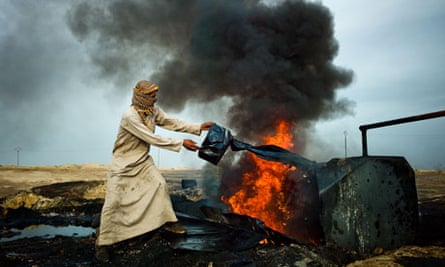
The secret to al-Nusra’s power in the east, he said, was organisation: all their captured loot went to a central committee, which he called the “Muslim treasury”. From there, it was directed to the various battle fronts.
“When we bring in cars or weapons, we don’t keep them,” said the emir: “the money is sent to the treasury, which distributes these resources.”
Rival groups wasted the proceeds of their looting locally, he said. “If your money is scattered around, you can’t succeed. But if you centralise your resources, you can do a lot.”
The emir had been a law student when the revolution started, he said. Back then, he identified himself as a salafist, though he did not follow al-Qaida. For a full year, he fought under the FSA banner. When al-Qaida first emerged in the east, he thought they would harm the revolution. “I used to disagree with [al-Qaida] over their policies. Even now, they make mistakes on the ground and they have had setbacks in Iraq and Somalia because of this. They focus too much on the sword rather than the Qur’an and preaching,” he said.
“I thought we shouldn’t declare our animosity to America now. I said, we can be jihadis but raise the flag of the FSA.”

What changed his mind was the chaos and corruption of the FSA. He had fought four battles with the FSA, he said, and seen how they argued over the spoils in the middle of the fighting.
“Religious leaders explained to me that we should not fight blindly, that the flag of the FSA is the flag of infidel secularism and that America is our enemy, whether we declare it or not. Americans will always fight us and will never be satisfied,” he said.
“We can’t topple Bashar and hand it to the FSA to establish the same apostate secularist state. We are not fighting against Bashar only; we are fighting the system.”
The tactics with which al-Nusra is waging its war are no less brutal than those of its al-Qaida-affiliated counterparts in other areas of the Middle East. A few weeks before our visit, after a feud with a local tribe over oil, al-Nusra fighters had surrounded the village of Albu Saray and taken the whole male population of the village prisoner. A few of them were accused of killing an al-Nusra commander, and were executed, and many of the houses in the village were flattened. “Do you know why the Americans and Israelis are winning and we Arabs always lose?” asked the emir. “Because we Arabs are emotional.”
Al-Nusra, by contrast, was an international organisation, and was “not built on emotions”. Its members should be ready to kill their brothers or cousins if they were proved to have to committed apostasy.
“Hitting Albu Saray was a pre-emptive strike,” he said. “They were weak. They had a bad reputation. Kill them, and you teach more powerful tribes a lesson. They will start fearing.”
‘This has broken our spine’
If the jihadis are in the ascendant in the east, they are not without challenges. The first of these is a strategy that bore fruit for the Americans in Iraq: the threat of an Arab “awakening”, or sahwa, in which the US pays tribes to fight the jihadists on their behalf. In Iraq, this delivered a disastrous defeat for al-Qaida and other jihadis, but it has since achieved mixed results in Yemen, Somalia and Afghanistan.
But while it took the Americans months of intricate negotiations and huge sums of money to convince a few tribal elders in Iraq, in Syria almost every other marginal tribal elder and his many cousins flirt with the the idea of sahwa, and the money that it could bring.
“They used to tell us that the FSA will turn to sahwa and fight us, which I thought was an exaggeration,” said the emir of gas before we departed. “Now I know that will happen for sure.

“After Bashar falls, I see the FSA battalions dividing into three parts. Some will go home to their previous lives, some will join us in establishing the rule of sharia, and a third part will become a sahwa and turn and fight us.”
More feared even than the threat of an “awakening”, is the risk of splits among the jihadi fighters themselves. In another part of the eastern countryside, I met a senior al-Nusra commander whose self-confident, jihadi way of speaking deserted him as he pondered the difficulties facing his group.
“I expected clashes with everyone: with the tribes, with the FSA, with anyone,” he said. “But with other jihadis? I never thought that day would come.”
In what many considered a coup against al-Nusra, the leader of the Iraqi branch of al-Qaida, Abu Bakra al-Baghdadi, declared that he would merge his own organisation with that of his Syrian brothers, under his leadership. The feud that followed was reminiscent of the infighting between warring branches of the Ba’ath party in Iraq and Syria in the 1960s.
“Yes, in the beginning they [al-Qaida in Iraq] did give us weapons and send us their leadership,” said the commander. “May Allah bless them. But now, we have become a state. We control massive areas, and they are but a faction. They don’t control land in Iraq: they were defeated. We have been sending them weapons and cars to strengthen their spear against the Iraqi rejectionist government, but now they want us to be part of them. That, I don’t understand.”
The foreign fighters – Iraqis, Tunisians, Egyptians and others – were angry with al-Nusra for not accepting the orders of the bigger emir of Iraq, he said. Eighty per cent of them had joined Baghdadi.
“This has broken our spine. Many of our fighters became lax. They ask: ‘Why are we fighting if there is a dispute among the emirs?’”

What will happen to them when they become mired in the realpolitik of civil war? Will they gradually sink into the quagmire, like every other faction?
“They say that al-Nusra has become soft, [that] they deal with the infidel FSA and co-ordinate with them and fight together,” said the commander. “The reality is that many of the people who have accepted al-Nusra in these area and started to accept our ideology did so because they saw people of the area join them. Now, they have retreated because al-Qaida entered very heavily.”
He cites an old Arabic proverb, which states that the people of Mecca know its valleys better than the outsiders. “We know better than the outsiders, who are here just to fight and kill. We have to learn from the mistakes of Iraq and the mistakes that toppled al-Qaida there and turned the tribes against them.”
Back at the oil company headquarters in Shadadi, the workers were discussing their new leaders in the shade of a corrugated metal sheet.
“We got rid of one despot [Bashar] and replaced him with another,” one man told a young technician who had given his oath to al-Nusra, and thereby been allowed to keep his job.
“As in every place, there are good people and bad people,” responded the technician.
“Why is it all right for you to take all the wheat silos and leave none for others?” the first man asked, bitterly.
“Because al-Nusra are the best to rule, and we can take care of the wheat,” said the technician.
“Wallah [truly],” responded the man, “al-Nusra takes a cut of everything here – even the air that we breathe.”
